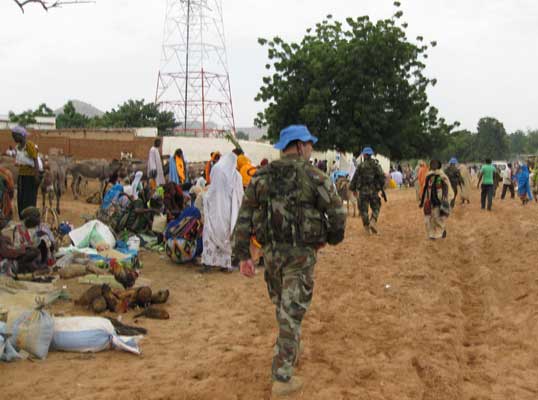Don't miss
- Washington “follows with interest” Morocco’s openness onto Africa (John Kerry)Posted 11 years ago
- The trial of South African Paralympic champion Oscar Pistorius opened in Pretoria on Monday.Posted 11 years ago
- USA welcomes efforts of King Mohammed VI in MaliPosted 11 years ago
- Egypt’s population reaches 94 millionPosted 11 years ago
- Mugabe celebrates his 90thPosted 11 years ago
- Moroccan Monarch to Build a Perinatal Clinic in BamakoPosted 11 years ago
- King Mohammed VI handed a donation of bovine semen for the benefit of Malian breeders.Posted 11 years ago
- Moroccan King’s strategic tour to Africa: Strengthening the will of pan African Solidarity and stimulating the south-south cooperation mechanisms over the continentPosted 12 years ago
- Senior al-Qaida leader killed in AlgeriaPosted 12 years ago
- Libya: The trial of former Prime Minister al-Baghdadi AliPosted 12 years ago
Chad/RCA: Departure of the U.N forces
By African Bulletin on May 27, 2010
 The U.N forces in Chad and Central African Republic (MINURCAT) will pack their bags and go back home before the end of December according to the Chadian government will, but to the great displeasure of NGO’s and certain member countries which worry about the destiny of the civilians they are in charge of.
The U.N forces in Chad and Central African Republic (MINURCAT) will pack their bags and go back home before the end of December according to the Chadian government will, but to the great displeasure of NGO’s and certain member countries which worry about the destiny of the civilians they are in charge of.The Security Council adopted on Tuesday unanimously the resolution 1923 which organises the MINURCAT withdrawal, in two phases, by December 31st.
According to the approved plan, the military constituent of the MINURCAT, which counts at present 3.300 soldiers, will be reduced to 2.200 men – 1.900 in Chad and 300 in RCA – by July 15th.
From October 15th, the remaining strengths, as well as the civil constituent of the mission – approximately one thousand persons – will be gradually removed until December 31st. The Security Council renewed the MINURCAT mandate till the end of the year, while removing it the responsibility of the civilians’ protection. This task will be re-appropriated by the Chadian government, on its demand.
The answer to this new position of president Déby is due partially to the improvement of the relations between its country and Sudan. After years of tensions, they undertook to stop any support for their respective rebel movements and planned for the deployment of joint mixed forces on their border.
N’Djamena «is determined to assume the whole responsibility of the security and protection of the civil population in eastern Chad”. The Security Council has passed an agreement with the Chadian government to fulfill and consent to all the regulations of the humanitarian international law.
The answer to this new position of president Déby is due partially to the improvement of the relations between its country and Sudan. After years of tensions, they undertook to stop any support for their respective rebel movements and planned for the deployment of joint mixed forces on their border.
N’Djamena «is determined to assume the whole responsibility of the security and protection of the civil population in eastern Chad”. The Security Council has passed an agreement with the Chadian government to fulfill and consent to all the regulations of the humanitarian international law.
